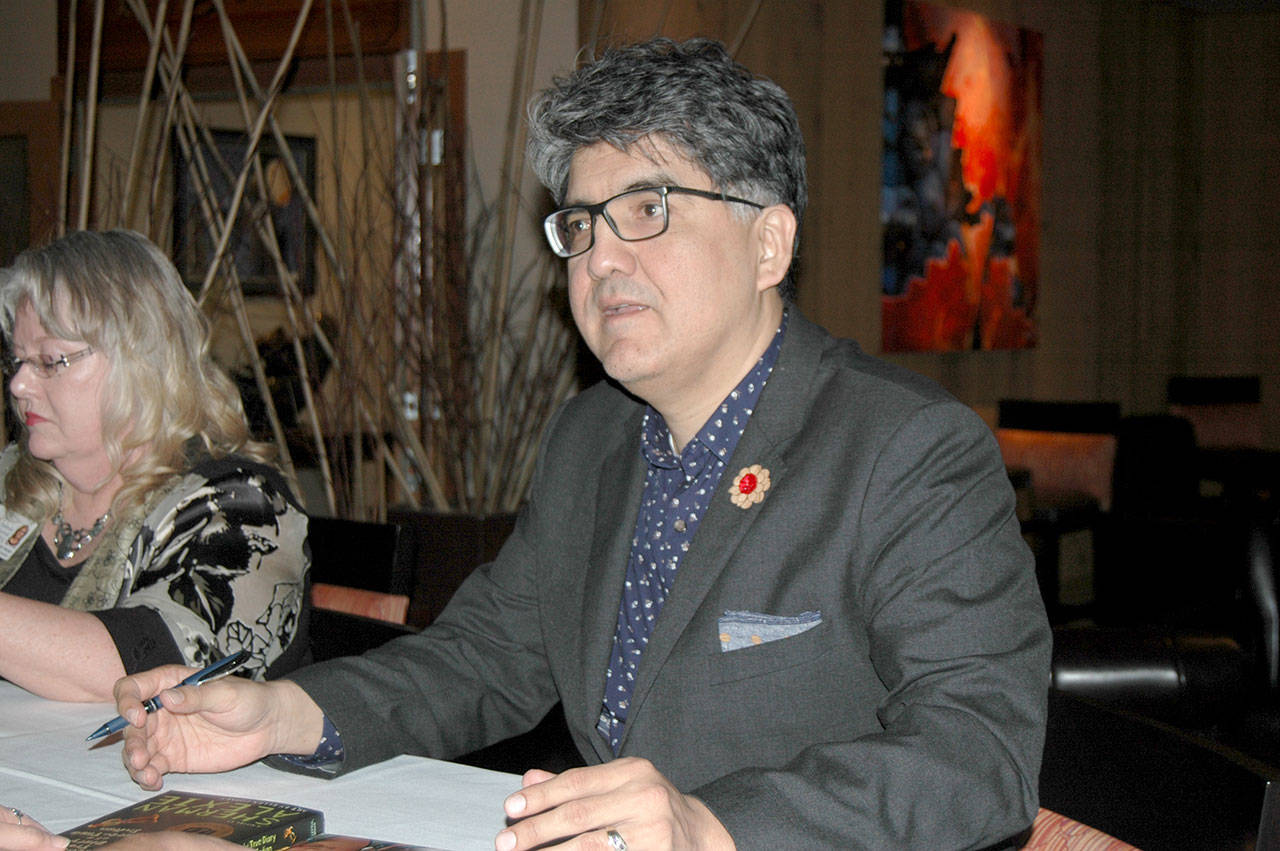BLYN — An author, playwright and poet told 200 people who paid $95 apiece for dinner Friday that he hears voices, hallucinates, gets manic, is bipolar, has a phobic fear of ferry travel and takes his medication about 95 percent of the time.
“I count and count and count and count,” Sherman Alexie, keynote speaker at Peninsula Behavioral Health’s annual fundraiser, added, piling obsessive compulsive disorder and hydrocephalus onto his list of maladies.
“Guess what?” Alexie continued as he addressed the audience at 7 Cedars Casino’s Club Seven.
“That makes me one of the greatest writers who has ever lived.”
Alexie, a Seattle resident, is the 2007 National Book Award winner in Young People’s Literature for the semi-autobiographical “The Absolutely True Diary of a Part-Time Indian.” He has authored more than two dozen books.
His presentation also made Alexie, 50, a fundraising machine for what PDH Development Coordinator Rebekah Miller said is Clallam County’s largest nonprofit organization.
Dinner-goers clapped, laughed — and squirmed just a little — through a 35-minute presentation that was sometimes irreverent, sometimes righteous and sometimes self-effacing but infused throughout with humor.
Then dinner-goers gave it up, answering master of ceremonies Dr. Paul Cunningham’s challenge to double the contribution they had planned when they set foot in the casino’s Club Seven banquet room-live music venue to hear what the well-known writer had to say.
The seventh annual event raised more than $30,000, far eclipsing the 2016 dinner’s $18,000, Miller said Saturday morning.
“They really stepped up realizing how much we really do need community support,” Miller said.
“I’m sure some people are still chewing this morning on what he said last night.
“It was powerful.”
Born to Native American parents, Alexie had brain surgery for hydrocephalus at 6 months old.
He grew up on the Spokane Native American reservation in Wellpinit and attended mostly white Reardan High School.
Both his mother and half sister were conceived by rape, and his father lost both his parents by age 6, Alexie said.
“In many ways, he never stopped being 6 years old,” Alexie said of his father, who died in 2004 of alcohol-related kidney failure.
Alexie grew up using an outhouse.
“I remember the day Sears brought the toilets,” he said. “I remember the day I screwed in a light bulb and the light went on.”
He recalled visiting Gonzaga University with his father before he attended the school . As they drove by the campus, “I asked my dad what that was,” Alexie said.
“I said, ‘What’s with all the green grass?’
“He said that’s where white kids play Frisbee.”
Alexie noted that he was giving his address the day after President Donald Trump’s health care bill passed the House of Representatives, asserting that insurance companies would not have to cover hydrocephalus, schizophrenia, manic depression or bipolarism as pre-exiting conditions.
“I don’t know how any of you fools voted for this and you are here and you work in this business,” he said.
He also spoke of being “ambiguously ethnic.”
“Traveling the world, I could be anything,” he said.
At the same time, once he’s identified as Native American, it opens the door to stereotypes.
”All the time, I hear, ‘You don’t look Indian,’ ” Alexie said.
“When your very physical appearance gets questioned, when you don’t measure up to pop culture’s idea of how you are supposed to look, how do you think that feels?
“That’s the way we disappear.”
Alexie described “the madness” of being asked if he lives in a tepee, of being asked if he can ride horses and asked over and over his opinion on casinos.
He spoke of turning on the TV and seeing Native American mascots for professional football, baseball and hockey teams.
“I venture that half of you don’t see the problem with Native American mascots,” he said. “You’re assholes.
“That’s a funny thing to say at a fundraiser, but I’m challenging you, because a lot of your clients have some version of this story regardless of where they come from.”
The day-to-day activity of being a Native American “can cause madness,” Alexie said.
Spurning Trump’s “Make America Great Again” mantra by saying how un-great America has been in the past on women’s rights and civil rights, he also took liberals to task for dreaming of a utopia and searching for a messiah.
“Do you not think that political rhetoric can make mental health worse?” Alexie asked.
“Your disbelief can feed mental illness on a community level.
“How crazy do you think it makes me feel that a reservation Indian like me is an optimist?”
Alexie said he is a rich man because he is good with metaphor.
“How can any of you doubt a country where that [expletive deleted] can happen?” he asked.
Many have abdicated American and religious ideals to take care of the less fortunate that call for efforts “to love the stranger that shows up at your door,” Alexie said.
“We crazy people need you sane people to stop being so [expletive deleted] crazy,” he added.
“Prove to me how much you love strangers, prove to me how much you love this country, prove to me that you’re sane.”
________
Senior Staff Writer Paul Gottlieb can be reached at 360-452-2345, ext. 55650, or at pgottlieb@peninsuladailynews.com.

